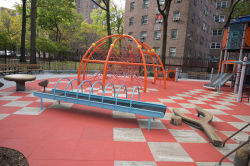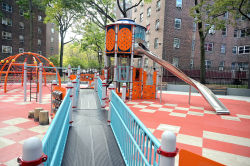Abraham Lincoln Playground
Abraham Lincoln Playground
What was here before?
East Harlem was once mostly industrial, and this park was the site of a coal yard that was surrounded by breweries and a lumber yard. It became a residential area in the 19th century to accommodate newly arrived immigrants mainly from Germany and Eastern Europe.
How did this site become a park?
In 1944, the City of New York acquired this playground as part of the Abraham Lincoln Houses. Two years later, the land came under NYC Parks’ jurisdiction and was named the Abraham Lincoln Houses Playground.
This site was renovated in 2021 through the Community Parks Initiative – a multi-faceted program to increase the accessibility and quality of parks throughout the five boroughs in an equitable manner. It now features a new basketball court, a mini pool with an ADA lift, multigenerational play areas, and spray showers.
What is this park named for?
This playground, as well as the adjacent Abraham Lincoln Houses, is named for the sixteenth president of the United States, Abraham Lincoln (1809-1865).
Born to migratory farmers in rural Kentucky, Lincoln had less than one year of formal schooling but was a voracious reader. In 1831, a young Lincoln settled in New Salem, Illinois. In 1834, Lincoln was elected to the state legislature, became a lawyer two years later, and ultimately served in the House of Representatives.
The newly formed Republican Party nominated Lincoln as its presidential candidate in 1860 after he gave an impassioned speech at Cooper Union in Manhattan. He ran on the promise to not interfere with slavery in the south but opposed expansion of the institution in the western territories. His membership with the American Colonization Society contributed to his moderate stance on slavery.
Lincoln won the presidency without majority support in a four-way contest. By his inauguration day on March 4, 1861, seven Southern states had seceded from the Union, and on April 12, 1861 the Civil War began when Fort Sumter in Charleston, South Carolina was attacked by the Confederate Army.
On January 1, 1863, Lincoln issued the Emancipation Proclamation, an executive order that freed all enslaved persons in the Confederate states. Lincoln won the presidency again in 1864 and vowed to unify the nation, “with malice toward none and charity for all.” He was assassinated on April 14, 1865, when Confederate sympathizer and stage actor, John Wilkes Booth (1838-1865) shot him at Ford’s Theater in Washington, D.C. The war ended a few weeks later on May 9, 1865 when Confederate General Robert E. Lee (1807-1870) surrendered to General Ulysses S. Grant (1822-1885) at the Battle of Appomattox in Virginia.
Check out your park's Vital Signs
Clean & Safe
Green & Resilient
Empowered & Engaged Users
Share your feedback or learn more about how this park is part of a
Vital Park System










